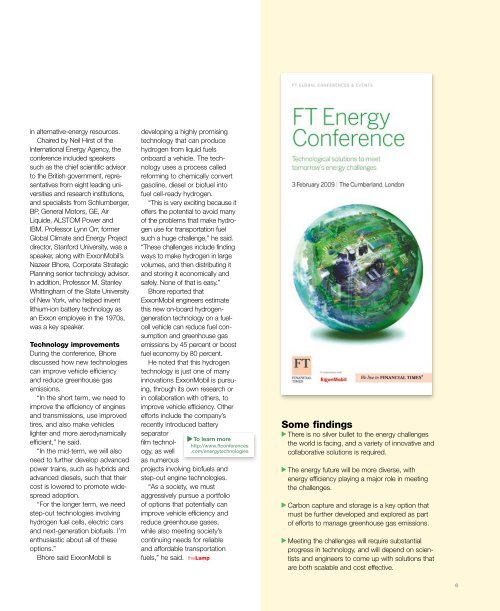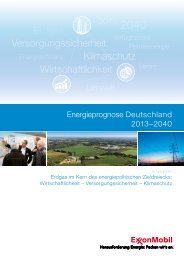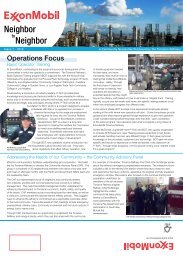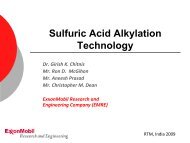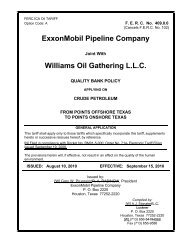ExxonMobil and Abu Dhabi
ExxonMobil and Abu Dhabi
ExxonMobil and Abu Dhabi
Create successful ePaper yourself
Turn your PDF publications into a flip-book with our unique Google optimized e-Paper software.
in alternative-energy resources.<br />
Chaired by Neil Hirst of the<br />
International Energy Agency, the<br />
conference included speakers<br />
such as the chief scientific advisor<br />
to the British government, representatives<br />
from eight leading universities<br />
<strong>and</strong> research institutions,<br />
<strong>and</strong> specialists from Schlumberger,<br />
BP, General Motors, GE, Air<br />
Liquide, ALSTOM Power <strong>and</strong><br />
IBM. Professor Lynn Orr, former<br />
Global Climate <strong>and</strong> Energy Project<br />
director, Stanford University, was a<br />
speaker, along with <strong>ExxonMobil</strong>’s<br />
Nazeer Bhore, Corporate Strategic<br />
Planning senior technology advisor.<br />
In addition, Professor M. Stanley<br />
Whittingham of the State University<br />
of New York, who helped invent<br />
lithium-ion battery technology as<br />
an Exxon employee in the 1970s,<br />
was a key speaker.<br />
Technology improvements<br />
During the conference, Bhore<br />
discussed how new technologies<br />
can improve vehicle efficiency<br />
<strong>and</strong> reduce greenhouse gas<br />
emissions.<br />
“In the short term, we need to<br />
improve the efficiency of engines<br />
<strong>and</strong> transmissions, use improved<br />
tires, <strong>and</strong> also make vehicles<br />
lighter <strong>and</strong> more aerodynamically<br />
efficient,” he said.<br />
“In the mid-term, we will also<br />
need to further develop advanced<br />
power trains, such as hybrids <strong>and</strong><br />
advanced diesels, such that their<br />
cost is lowered to promote widespread<br />
adoption.<br />
“For the longer term, we need<br />
step-out technologies involving<br />
hydrogen fuel cells, electric cars<br />
<strong>and</strong> next-generation biofuels. I’m<br />
enthusiastic about all of these<br />
options.”<br />
Bhore said <strong>ExxonMobil</strong> is<br />
developing a highly promising<br />
technology that can produce<br />
hydrogen from liquid fuels<br />
onboard a vehicle. The technology<br />
uses a process called<br />
reforming to chemically convert<br />
gasoline, diesel or biofuel into<br />
fuel cell-ready hydrogen.<br />
“This is very exciting because it<br />
offers the potential to avoid many<br />
of the problems that make hydrogen<br />
use for transportation fuel<br />
such a huge challenge,” he said.<br />
“These challenges include finding<br />
ways to make hydrogen in large<br />
volumes, <strong>and</strong> then distributing it<br />
<strong>and</strong> storing it economically <strong>and</strong><br />
safely. None of that is easy.”<br />
Bhore reported that<br />
<strong>ExxonMobil</strong> engineers estimate<br />
this new on-board hydrogengeneration<br />
technology on a fuelcell<br />
vehicle can reduce fuel consumption<br />
<strong>and</strong> greenhouse gas<br />
emissions by 45 percent or boost<br />
fuel economy by 80 percent.<br />
He noted that this hydrogen<br />
technology is just one of many<br />
innovations <strong>ExxonMobil</strong> is pursuing,<br />
through its own research or<br />
in collaboration with others, to<br />
improve vehicle efficiency. Other<br />
efforts include the company’s<br />
recently introduced battery<br />
separator<br />
film technology,<br />
as well<br />
as numerous<br />
projects involving biofuels <strong>and</strong><br />
step-out engine technologies.<br />
“As a society, we must<br />
To learn more<br />
http://www.ftconferences<br />
.com/energytechnologies<br />
aggressively pursue a portfolio<br />
of options that potentially can<br />
improve vehicle efficiency <strong>and</strong><br />
reduce greenhouse gases,<br />
while also meeting society’s<br />
continuing needs for reliable<br />
<strong>and</strong> affordable transportation<br />
fuels,” he said. the Lamp<br />
Some findings<br />
There is no silver bullet to the energy challenges<br />
the world is facing, <strong>and</strong> a variety of innovative <strong>and</strong><br />
collaborative solutions is required.<br />
The energy future will be more diverse, with<br />
energy efficiency playing a major role in meeting<br />
the challenges.<br />
Carbon capture <strong>and</strong> storage is a key option that<br />
must be further developed <strong>and</strong> explored as part<br />
of efforts to manage greenhouse gas emissions.<br />
Meeting the challenges will require substantial<br />
progress in technology, <strong>and</strong> will depend on scientists<br />
<strong>and</strong> engineers to come up with solutions that<br />
are both scalable <strong>and</strong> cost effective.<br />
6


